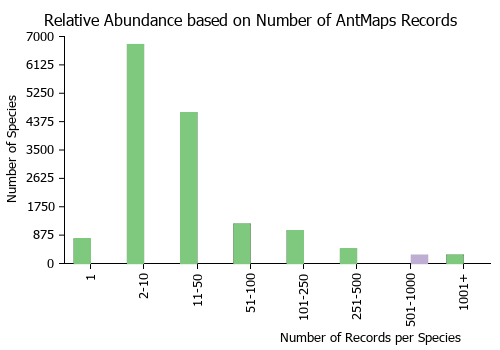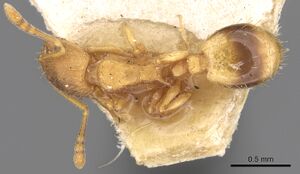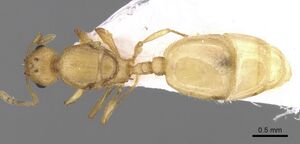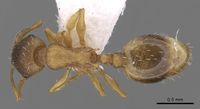Temnothorax lichtensteini
| Temnothorax lichtensteini | |
|---|---|

| |
| Scientific classification | |
| Kingdom: | Animalia |
| Phylum: | Arthropoda |
| Class: | Insecta |
| Order: | Hymenoptera |
| Family: | Formicidae |
| Subfamily: | Myrmicinae |
| Tribe: | Crematogastrini |
| Genus: | Temnothorax |
| Species group: | nylanderi |
| Species complex: | lichtensteini |
| Species: | T. lichtensteini |
| Binomial name | |
| Temnothorax lichtensteini (Bondroit, 1918) | |
Temnothorax lichtensteini is distributed widely in xerothermous open forests across the northern coastline of the Mediterranean region from the Iberian Peninsula to Western Turkey, and from 47°N in Austria to 37°N in Greece.
Identification
Csösz et al. (2013) - Part of a lichtensteini species-complex of cryptic species, Temnothorax laconicus can be separated from T. lichtensteini by measuring a series of workers and using a Nest Centroid Clustering function (see Csősz et al. 2013).
Csösz et al. (2015) - Members of the Temnothorax lichtensteini complex (T. lichtensteini and Temnothorax laconicus) can be easily distinguished from other species treated in this revision by the very long propodeal spines and their low deviation (20–25°) from the mesosomal axis. Other species with long spines have more erect propodeal spines deviating from the mesosomal axis by >35°. How T. lichtensteini and T. laconicus can be separated is described under the latter.
Keys including this Species
Distribution
This is a northern species recorded from Epirus, the Ionian Islands, Macedonia, Sterea Ellas, Thessaly and Thrace (Borowiec et al., 2022).
Latitudinal Distribution Pattern
Latitudinal Range: 46.6981° to 37.6704°.
| North Temperate |
North Subtropical |
Tropical | South Subtropical |
South Temperate |
- Source: AntMaps
Distribution based on Regional Taxon Lists
Palaearctic Region: Andorra, Austria, Balearic Islands, Bulgaria, Croatia, France (type locality), Greece, Iberian Peninsula, Italy, Liechtenstein, Montenegro, North Macedonia, Slovenia, Spain, Türkiye.
Distribution based on AntMaps
Distribution based on AntWeb specimens
Check data from AntWeb
Countries Occupied
| Number of countries occupied by this species based on AntWiki Regional Taxon Lists. In general, fewer countries occupied indicates a narrower range, while more countries indicates a more widespread species. |

|
Estimated Abundance
| Relative abundance based on number of AntMaps records per species (this species within the purple bar). Fewer records (to the left) indicates a less abundant/encountered species while more records (to the right) indicates more abundant/encountered species. |

|
Biology
Association with Other Organisms
 Explore: Show all Associate data or Search these data. See also a list of all data tables or learn how data is managed.
Explore: Show all Associate data or Search these data. See also a list of all data tables or learn how data is managed.
Other Ants
- This species is a host for the ant Temnothorax gordiagini (a dulotic parasite) (Buschinger et al., 1984).
- This species is a host for the ant Temnothorax menozzii (a dulotic parasite) (Báthori et al., 2024).
- This species is a host for the ant Temnothorax ravouxi (a dulotic parasite) (Báthori et al., 2024).
Cestoda
- This species is a host for the cestode Choanotaenia crateriformis (a parasite) in Spain (Espadaler & Riasol, 1983; Laciny, 2021).
Fungi
- This species is a host for the fungus Myrmicinosporidium durum (a pathogen) (Espadaler & Santamaria, 2012).
Castes
Worker
Images from AntWeb
   
| |
| Worker. Specimen code casent0906004. Photographer Estella Ortega, uploaded by California Academy of Sciences. | Owned by PCAS, Andreas Schulz Collection. |
   
| |
| Worker. Specimen code casent0906165. Photographer Cerise Chen, uploaded by California Academy of Sciences. | Owned by NHMUK, London, UK. |
Queen
Images from AntWeb
   
| |
| Queen (alate/dealate). Specimen code casent0906006. Photographer Estella Ortega, uploaded by California Academy of Sciences. | Owned by PCAS, Andreas Schulz Collection. |
   
| |
| Queen (alate/dealate). Specimen code casent0906007. Photographer Estella Ortega, uploaded by California Academy of Sciences. | Owned by PCAS, Andreas Schulz Collection. |
Nomenclature
The following information is derived from Barry Bolton's Online Catalogue of the Ants of the World.
- lichtensteini. Leptothorax lichtensteini Bondroit, 1918: 123 (w.q.m.) FRANCE.
- Combination in Temnothorax: Bolton, 2003: 271.
- Subspecies of nylanderi: Menozzi, 1921: 28; Menozzi, 1922b: 329; Müller, 1923a: 71; Müller, 1923b: 95; Emery, 1924d: 255; Menozzi, 1925d: 27; Novák & Sadil, 1941: 91 (in key).
- Status as species: Bondroit, 1920a: 154; Bernard, 1956a: 162; Bernard, 1967: 205 (redescription); Collingwood & Yarrow, 1969: 70; Baroni Urbani, 1971c: 114; Baroni Urbani, 1976: 214; Collingwood, 1978: 84 (in key); Agosti & Collingwood, 1987b: 274 (in key); Casevitz-Weulersse, 1990c: 418 (in key); Bolton, 1995b: 240; Csösz, et al. 2014: 85 (redescription); Csösz, Heinze & Mikó, 2015: 33 (redescription).
Type Material
Csősz et al. (2013) - Four workers labeled “Montpellier Jean Lichtenstein”, Leptoth. lichtensteini Type Bondr. and “Lecotype Leptothorax lichtensteini Bondroit 1918 Top specimen det. A.Schulz & M.Verhaagh 1999”; IRSNB Bruxelles; lectotype with CS 546.6. 5 workers labeled “Menton de Dalmas” and “Leptoth. lichtensteini Type Bondr. ”; IRSNB Bruxelles. Unless otherwise noted the text for the remainder of this section is reported from the publication that includes the original description.
Description
Worker
Csősz et al. (2013) - General colouration of this species is somewhat lighter than that of Temnothorax laconicus; appendages, mesosoma, waist and basis of first gaster tergite-yellow to dirty yellowish-brown. Head dorsum and the posterior surfaces of gaster tergites darker, usually dirty yellowish-brown to light-brown. Small species (CS 535 μm), but similar in size to its sister species. Head significantly longer than broad (CL/CWb 1.226) and with feebly convex sides. Vertexal corners rounded, posterior margin of vertex strait. Scape long (SL/CS 0.786) with variable pubescence: adpressed (0–5°) to decumbent (10–15°) on the surface that is adjacent to head surface when the scape is directed fully caudad and subdecumbent (30°) on the surface that becomes external in the same scape position. Clypeus between sagittal level of frontal carinaewith a number of longitudinal carinulae, interstices smooth and shiny. Eyes rather large (EL/CS 0.248) and more approached to hind margin of vertex (PoOc/CL 0.401). Vertex with fine microreticulate sculpture that is superimposed by a number of longitudinal rugulae. Frontal carinae non-divergent and widely distant (FRS/CS 0.357). Propodeal spines long, but significantly shorter than in T. laconicus (SPST/CS 0.347) and acute, in lateral view deviating from longitudinal axis of mesosoma by 20–25°. In dorsal view, propodeal spines less divergent than in the sibling species (SPWI/CS 0.393), spine-tips curving inward (SPTI/CS 0.373). Mesosoma as wide as in related species (MW/CS 0.610). Metanotal depression well visible, moderately deep. Mesosoma with fine microreticulate microsculpture that is superimposed by a few irregular or longitudinal rugulae. Petiole and postpetiole covered by a reticulate microsculpture that can occasionally be superimposed by a few irregular rugulae in particular on dorsum of petiolar node. Petiole in profile with a rather straight or slightly concave anterior face; top of node forms a short truncate dorsum that continue to posterior slope with a distinct step.
Karyotype
- See additional details at the Ant Chromosome Database.
 Explore: Show all Karyotype data or Search these data. See also a list of all data tables or learn how data is managed.
Explore: Show all Karyotype data or Search these data. See also a list of all data tables or learn how data is managed.
- n = 14 (Croatia, France, Italy) (Fischer, 1987) (as Leptothorax lichtensteini).
References
- Bernadou, A., Fourcassié, V., Espadaler, X. 2013. A preliminary checklist of the ants (Hymenoptera, Formicidae) of Andorra. ZooKeys 277, 13–23 (doi:10.3897/zookeys.277.4684).
- Bernard, F. 1956a. Révision des Leptothorax (Hyménoptères Formicidae) d'Europe occidentale, basée sur la biométrie et les genitalia mâles. Bull. Soc. Zool. Fr. 81: 151-165 (page 162, Revived status as species)
- Bernard, F. 1967a [1968]. Faune de l'Europe et du Bassin Méditerranéen. 3. Les fourmis (Hymenoptera Formicidae) d'Europe occidentale et septentrionale. Paris: Masson, 411 pp. (page 205, Revived status as species)
- Bolton, B. 2003. Synopsis and Classification of Formicidae. Mem. Am. Entomol. Inst. 71: 370pp (page 271, Combination in Temnothorax)
- Bondroit, J. 1918. Les fourmis de France et de Belgique. Ann. Soc. Entomol. Fr. 87: 1-174 (page 123, worker, queen, male described)
- Borowiec, L. & Salata, S. 2013. Ants of Greece – additions and corrections (Hymenoptera Formicidae). Genus (Wroclaw) 24, 335-401.
- Borowiec, L. 2014. Catalogue of ants of Europe, the Mediterranean Basin and adjacent regions (Hymenoptera: Formicidae). Genus (Wroclaw) 25(1-2): 1-340.
- Borowiec, L., Lebas, C., Salata, S. 2022. Notes on ants (Hymenoptera: Formicidae) from three northern Aegean islands – Lemnos, Samothraki and Thasos. Annals of the Upper Silesian Museum in Bytom, Entomology 31: 1-14 (doi:10.5281/ZENODO.7346453).
- Borowiec, L., Salata, S. 2021. Notes on ants (Hymenoptera: Formicidae) from Western Greece. Annals of the Upper Silesian Museum in Bytom Entomology 30: 1-23 (doi:10.5281/ZENODO.5571258).
- Borowiec, L., Salata, S. 2022. Notes on ants (Hymenoptera: Formicidae) of Thassos Island, Greece. Annals of the Upper Silesian Museum in Bytom, Entomology 31 (online 2): 1-15 (doi:10.5281/ZENODO.6123287).
- Borowiec, L., van Delft, J.P.L., van Delft, J.J.C.W., Salata, S. 2023. Five ant species (Hymenoptera: Formicidae) new to the Greek fauna with notes on ants from Greek Thrace. Annales of the Upper Silesian Museum in Bytom, Entomology 32 (online 008), 1-13 (doi:10.5281/ZENODO.10101028).
- Bulter, I. 2020. Hybridization in ants. Ph.D. thesis, Rockefeller University.
- Castracani, C., Spotti, F.A., Schifani, E., Giannetti, D., Ghizzoni, M., Grasso, D.A., Mori, A. 2020. Public engagement provides first insights on Po Plain ant communities and reveals the ubiquity of the cryptic species Tetramorium immigrans (Hymenoptera, Formicidae). Insects 11, 678. (doi:10.3390/insects11100678).
- Collingwood, C. A.; Yarrow, I. H. H. 1969. A survey of Iberian Formicidae (Hymenoptera). EOS. Rev. Esp. Entomol. 44: 53-101 (page 70, Revived status as species)
- Csösz, S., Heinze, J., Mikó, I. 2015. Taxonomic synopsis of the Ponto-Mediterranean ants of Temnothorax nylanderi species-group. PLoS ONE 10(11): e0140000 (doi:10.1371/journal.pone.0140000).
- Espadaler, G.X., Riasol, B.J.M. 1983. Cisticercoides de Cyclophyllidea en hormigas Leptothorax Mayr. Modificaciones morfologicas y etologicas del huesped intermediario. Revista Iberica de Parasitologia 43: 219-227.
- Espadaler, X., Santamaria, S. 2012. Ecto- and Endoparasitic Fungi on Ants from the Holarctic Region. Psyche Article ID 168478, 10 pages (doi:10.1155/2012/168478).
- Kiran, K., Karaman, C. 2020. Additions to the ant fauna of Turkey (Hymenoptera, Formicidae). Zoosystema 42(18), 285-329 (doi:10.5252/zoosystema2020v42a18).
- Lapeva-Gjonova, A., Antonova, V. 2022. An updated checklist of ants (Hymenoptera, Formicidae) of Bulgaria, after 130 years of research. Biodiversity Data Journal 10, e95599 (doi:10.3897/bdj.10.e95599).
- Lapeva-Gjonova, A., Antonova, V., Ljubomirov, T. 2021. Ants (Hymenoptera, Formicidae) of Sarnena Sredna Gora Mountains (Bulgaria). Fauna of Sarnena Sredna Gora Mts, Part 2 ZooNotes, Supplement 10: 18-27.
- Menozzi, C. 1921. Formiche dei dintorni di Sambiase di Calabria. Boll. Lab. Zool. Gen. Agrar. R. Sc. Super. Agric. 15: 24-32 (page 28, Variety/subspecies of nylanderi)
- Menozzi, C. 1925d [1924]. Res mutinenses. Formicidae (Hymenoptera). Atti Soc. Nat. Mat. Modena 55[=(6)3 3: 22-47 (page 27, Variety/subspecies of nylanderi)
- Rigato, F.; Toni, I. 2011. Short notes 21. Hymenoptera, Formicidae. Pp. 873-882 in: Nardi, G.; Whitmore, D.; Bardiani, M.; Birtele, D.; Mason, F.; Spada, L.; Cerretti, P. (eds.) 2011. Biodiversity of Marganai and Montimannu (Sardinia). Research in the framework of the ICP Forests network. Conservazione Habitat Invertebrati, 5. Sommacampagna, Verona: Cierre Edizioni, 896 pp.
- Salata, S., Borowiec, L. 2019. Preliminary division of not socially parasitic Greek Temnothorax Mayr, 1861 (Hymenoptera, Formicidae) with a description of three new species. ZooKeys 877: 81-131 (doi:10.3897/zookeys.877.36320).
- Schär, S., Menchetti, M., Schifani, E., Hinojosa, J.C., Platania, L., Dapporto, L., Vila, R. 2020. Integrative biodiversity inventory of ants from a Sicilian archipelago reveals high diversity on young volcanic islands (Hymenoptera: Formicidae). Organisms Diversity, Evolution 20, 405–416 (doi:10.1007/s13127-020-00442-3).
- Schifani, E., Csősz, S., Viviano, R., Alicata, A. 2021. Ant diversity on the largest Mediterranean islands: on the presence or absence of 28 species in Sicily (Hymenoptera, Formicidae). Natural History Sciences 8, 55–70 (doi:10.4081/nhs.2021.532).
- Schifani, E., Nalini, E., Gentile, V., Alamanni, F., Ancona, C., Caria, M., Cillo, D., Bazzato, E. 2021. Ants of Sardinia: An updated checklist based on new faunistic, morphological and biogeographical notes. Redia 104, 21–35 (doi:10.19263/redia-104.21.03).
References based on Global Ant Biodiversity Informatics
- AntArea. Accessed on February 5th 2014 at http://antarea.fr/fourmi/
- Antarea (at www.antarea.fr on June 11th 2017)
- Arnan, X., A. Rodrigo and J. Retana. 2006. Post-fire recovery of Mediterranean ground ant communities follows vegetation and dryness gradients. Journal of Biogeography 33(7):1246-1258
- Asociacion Iberica de Mirmecologia. 2011. List of species collected during the Taxomara Lisboa 2011. Iberomyrmex 3: 30-31.
- Baroni Urbani C. 1976. Le formiche dell'arcipelago della Galita (Tunisia). Redia 59: 207-223.
- Barrett K. E. J. 1968. Ants in western France. Entomologist 101: 153-155.
- Bernard F. 1956. Révision des Leptothorax (Hyménoptères Formicidae) d'Europe occidentale, basée sur la biométrie et les genitalia mâles. Bull. Soc. Zool. Fr. 81: 151-165.
- Bernard F. 1967. Faune de l'Europe et du Bassin Méditerranéen. 3. Les fourmis (Hymenoptera Formicidae) d'Europe occidentale et septentrionale. Paris: Masson, 411 pp.
- Berville L., C. Santelli, J. Reybaud, M. Renucci, P. Ponel, O. Blight, and E. Provost. 2014. Suivi d’un site atelier dans le golfe de Fos: Une diversite myrmecologique insoupconne. Etudes Vauclusiennes 82: 71-78.
- Berville L., M. Renucci, P. Vidal, and E. Provost. 2016. Peuplement myrmecologique et evaluation de l'invasion de Linepithema humile sur les iles de Marseille (Bouches-du-Rhone, France). Revue d'Ecologie (Terre et Vie) 71(3): 278-287.
- Berville L., M. Renucci, and E. Provost. 2012. Mise en place de protocoles de contrôle de la fourmi dArgentine (Linepithema humile) sur les îles de Port-Cros et de Porquerolles (Var, France). Sci. Rep. Port-Cros natl. Park, 26: 91-108.
- Blatrix R., C. Lebas, C. Galkowski, P. Wegnez, P. Pimenta, and D. Morichon. 2016. Vegetation cover and elevation drive diversity and composition of ant communities (Hymenoptera: Formicidae) in a Mediterranean ecosystem. – Myrmecological News 22: 119-127.
- Bonaric J. C. 1971. Contribution a l'etude systematique et ecologique des formicides du Bas-Languedoc. PhD thesis Universite des sciences et techniques du Languedoc, 175 pages.
- Bonaric J. C. 1971. Étude systématique et ecologique des fourmis de lHérault (suite). Ann. Soc. Hortic. Hist. Nat. Hérault 111: 119-126.
- Borowiec L. 2014. Catalogue of ants of Europe, the Mediterranean Basin and adjacent regions (Hymenoptera: Formicidae). Genus (Wroclaw) 25(1-2): 1-340.
- Borowiec L., and S. Salata. 2012. Ants of Greece - Checklist, comments and new faunistic data (Hymenoptera: Formicidae). Genus 23(4): 461-563.
- Borowiec L., and S. Salata. 2013. Ants of Greece additions and corrections (Hymenoptera: Formicidae). Genus (Wroclaw) 24(3-4): 335-401.
- Borowiec L., and S. Salata. 2015. Pheidole symbioticaWasmann, 1909, an enigmatic supposed social parasite, is a nematodeinfested form of Pheidole pallidula(Nylander, 1849) (Hymenoptera: Formicidae: Myrmicinae). Sociobiology 62(2): 181-186.
- Bracko G. 2007. Checklist of the ants of Slovenia (Hymenoptera: Formicidae). Natura Sloveniae 9: 15-24
- Bracko G., K. Kiran, C. Karaman, S. Salata, and L. Borowiec. 2016. Survey of the ants (Hymenoptera: Formicidae) of the Greek Thrace. Biodiversity Data Journal 4: e7945. doi: 10.3897/BDJ.4.e7945
- Bracko, G. 2006. Review of the ant fauna (Hymenoptera:Formicidae) of Croatia. Acta Entomologica Slovenica 14(2): 131-156.
- Bracko, G. "Review of the ant fauna (Hymenoptera: Formicidae) of Croatia." Acta Entomologica Slovenica Vol 14 st (2006): 131-156.
- Buschinger, A., U. Winter, and W. Faber. "The biology of Myrmoxenus gordiagini Ruzsky, a slave-making ant (Hymenoptera, Formicidae)." Psyche (Cambridge) 90 (1984): 335-342.
- Buschinger, A., W. Ehrhardt, K. Fischer, and J. Ofer. "The slave-making ant genus Chalepoxenus (Hymenoptera, Formicidae). I. Review of literature, range, slave species." Zoologische Jahrbücher, Abteilung für Systematik, Ökologie und Geographie der Tiere (Jena) 115 (1988): 383-401.
- Casevitz-Weulersse J. 1990. Etude Systematique de la Myrmecofaune Corse (Hymenoptera: Formicidae), deuxieme partie. Bull. Mus. Natn. Hist. Nat. Paris. 4eme serie 12, section A(2): 415-442.
- Casevitz-Weulersse J. 1992. La myrmecofaune de la reserve naturelle de Scandola, inventaire spécifique (1984/85-1991). Trav. Sci. Parc nat. Res. Nat. Corse, Fr, 36: 85-108.
- Casevitz-Weulersse, J. "Contribution a la connaisance des fourmis de la Corse (Hymenoptera: Formicidae)." These de Doctorat Museum Nat (1989): 379pp.
- Castracani C., D. A. Grasso, A. Fanfani, and A. Mori. 2010. The ant fauna of Castelporziano Presidential Reserve (Rome, Italy) as a model for the analysis of ant community structure in relation to environmental variation in Mediterranean ecosystems. J Insect Conserv 14: 585594.
- Collingwood, C. A., and I. H. H. Yarrow. "A survey of Iberian Formicidae." EOS (Revista española de entomología) 44 (1969): 53-101.
- Csosz S., B. Seifert, B. Muller, A. Trindl, A. Schulz, J. Heinze. 2013. Cryptic diversity in the Mediterranean Temnothorax lichtensteini species complex (Hymenoptera: Formicidae). Org Divers Evol DOI 10.1007/s13127-013-0153-3
- Csősz S, Heinze J, and I. Mikó. 2015. Taxonomic synopsis of the Ponto-Mediterranean ants of Temnothorax nylanderi species-group. PLoS ONE 10(11): e0140000. doi:10.1371/journal.pone.0140000
- Czechowski W., A. Radchenko, W. Czechowska and K. Vepsäläinen. 2012. The ants of Poland with reference to the myrmecofauna of Europe. Fauna Poloniae 4. Warsaw: Natura Optima Dux Foundation, 1-496 pp
- Della Santa E. 1995. Fourmis de Provence. Faune Provence 16: 5-37.
- Du Merle P. 1978. Les peuplements de fourmis et les peuplements d'acridiens du Mont Ventoux II. - Les peuplements de fourmis. Terre Vie 32(1): 161-218.
- Espadaler X. F. Garcia, K. Gomez, S. Serrano, and R. Vila. 2009. Ants (Hymenoptera, Formicidae) from Mont-Rebei gorge (Pallars Jussà). Boletín Sociedad Entomológica Aragonesa 44: 393399.
- Espadaler X., F. Garcia, X. Roig, and R. Vila. 2013. Ants (Hymenoptera, Formicidae) from the Castell de Montesquiu park (Osona, north-east of the Iberian Peninsula). Boletín de la Sociedad Entomológica Aragonesa (S.E.A.) 53: 223-227.
- Espadaler, X., and X. Roig. "Ants from the Montnegre-Corredor Natural Park with description of the male lasius cinereus Seifert." Miscellanea Zoologica 23 (2) (2001): 45-53. Abstract
- Espadaler, X. "Catalogos entomofauna aragonesa: Familia: Formicidae." Catalogos entomofauna aragonesa 13 (1997): 13-21.
- Galkowski C. 2011. Une liste des fourmis (Hymenoptera, Formicidae) récoltées dans la région de Grasse, avec la mention dune nouvelle espèce de la faune de France. Bulletin de la Société linnéenne de Provence, 62 : 41-44.
- Garcia F., X. Espadaler, and K. Gomez. 2009. First record of Amblyopone impressifrons (Emery, 1869) from the Iberian Peninsula and of Proceratium melinum (Roger, 1860) from Catalonia (Hymenoptera, Formicidae). Boletín Sociedad Entomológica Aragonesa 45: 357-360.
- García F., X. Espadaler, P. Echave, and R. Vila. 2011. Hormigas (Hymenoptera, Formicidae) de los acantilados de l'Avenc de Tavertet (Osona) Boletín de la Sociedad Entomológica Aragonesa 47: 363-367.
- Glaser F., A. Freitag, and H. Martz. 2012. Ants (Hymenoptera: Formicidae) in the Münstertal (Val Müstair) a hot spot of regional species richness between Italy and Switzerland. Gredleriana 12: 273 - 284.
- Grandi G. 1935. Contributi alla conoscenza degli Imenotteri Aculeati. XV. Boll. R. Ist. Entomol. Univ. Studi Bologna 8: 27-121.
- Karaman M. G. 2011. A catalogue of the ants (Hymenoptera, Formicidae) of Montenegro. Podgorica: Catalogues 3, Volume 2, Montenegrin Academy of Sciences and Arts, 140 pp.
- Lebas C., C. Galkowski, P. Wegnez, X. Espadaler, and R. Blatrix. 2015. The exceptional diversity of ants on mount Coronat (Pyrénées-Orientales), and Temnothorax gredosi(Hymenoptera, Formicidae) new to France. R.A.R.E., T. XXIV (1): 24 33
- Legakis A. 2001. Ants (Hymenoptera, Formicidae) collected in the eastern Pyrenees and surrounding area, September 1999. Proceedings of the International Colloqium of the European Invertebrate Survey: Cartography and Conservation of Biodiversity Marcevol Priory, Arboussols, france 30.8-4.9.1999. OPIE.
- Legakis Collection Database
- Lombarte, A., S. Romero, and Andrés de Haro. "Contribución al conocimiento faunístico de los formicidos de la Sierra de Collserola (Barcelona)." Orsis 4 (1989): 125-140.
- Müller, G. "Le formiche della Venezia Guilia e della Dalmazia." Bollettino della Società Adriatica di Scienze Naturali in Trieste 28 (1923): 11-180.
- Petrov I. Z., and C. A. Collingwood. 1992. Survey of the myrmecofauna (Formicidae, Hymenoptera) of Yugoslavia. Archives of Biological Sciences (Belgrade) 44: 79-91.
- Renucci, M., A. Tirard and E. Provost. 2011. Complex undertaking behavior in Temnothorax lichtensteini ant colonies: from corpse-burying behavior to necrophoric behavior. Insectes Sociaux 58:9-16
- Rigato F., and J. K. Wetterer. 2018. Ants (Hymenoptera: Formicidae) of San Marino. Natural History Sciences. Atti Soc. it. Sci. nat. Museo civ. Stor. nat. Milano, 5(2): https://doi.org/10.4081/nhs.2018.367
- Rigato S., and I. Toni. 2011. Short notes 21. Hymenoptera, Formicidae. Pp. 873-882 in: Nardi, G.; Whitmore, D.; Bardiani, M.; Birtele, D.; Mason, F.; Spada, L.; Cerretti, P. (eds.) 2011. Biodiversity of Marganai and Montimannu (Sardinia). Research in the framework of the ICP Forests network. Conservazione Habitat Invertebrati, 5. Sommacampagna, Verona: Cierre Edizioni, 896 pp.
- Salata S., and L. Borowiec. 2018. Taxonomic and faunistic notes on Greek ants (Hymenoptera: Formicidae). Annals of the Upper Silesian Museum in Bytom Entomology 27: 1-51.
- Salata S., and L. Borowiec. 2019. Preliminary division of not socially parasitic Greek Temnothorax Mayr, 1861 (Hymenoptera, Formicidae) with a description of three new species. ZooKeys 877: 81-131.
- Sanchez-Gil Jimeno R., and J. L. Reyes-Lopez. 2016. Study of ants species of the Sierra de San Carlos del Valle (Ciudad Real) and updating the provincial check list (Hymenoptera, Formicidae). Boln. Asoc. esp. Ent. 40 (1-2): 93-109.
- Sommer F. 1984. Etude de la myrmécofaune de la réserve de la Massane. Laboratoire Arago, Banyuls sur Mer (66), 29 pages.
- Sommer F., and H. Cagniant. 1988. Peuplements de fourmis des Albères Orientales (Pyrénées-Orientales, France) (Première partie). Vie Milieu 38: 189-200.
- Zimmermann, S. "Beitrag zur Kenntnis der Ameisenfauna Süddalmatiens." Verhandlungen der Zoologisch-Botanisch Gesellschaft in Wien 84 (1935): 1-65.
- Pages using DynamicPageList3 parser function
- North temperate
- Ant Associate
- Host of Temnothorax gordiagini
- Host of Temnothorax menozzii
- Host of Temnothorax ravouxi
- Cestode Associate
- Host of Choanotaenia crateriformis
- Fungus Associate
- Host of Myrmicinosporidium durum
- Karyotype
- Species
- Extant species
- Formicidae
- Myrmicinae
- Crematogastrini
- Temnothorax
- Temnothorax lichtensteini
- Myrmicinae species
- Crematogastrini species
- Temnothorax species
- Ssr

